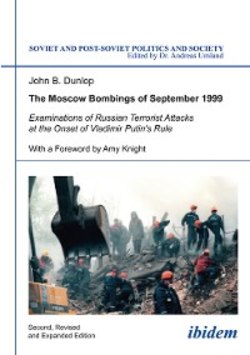Читать книгу The Moscow Bombings of September 1999 - Dunlop John Colin - Страница 4
Foreword
ОглавлениеJohn Dunlop’s path-breaking book about the bombings in Russia in September 1999 remains the best account we have of these horrific attacks. Many years have gone by without those in Russia or the West learning the full story. And that story may never emerge, at least as long as Russian President Vladimir Putin remains in power. But Dunlop’s impeccable research, touching on a vast number of sources, has contributed a great deal towards our understanding of these events. And the book makes fascinating reading for anyone interested in Russian politics and the reign of Vladimir Putin.
The bombings, as Dunlop makes clear, paved the way for Putin’s ascendancy to the presidency, and much of the evidence suggests that Putin and his former colleagues in the FSB were the orchestrators. There have been many terrorist attacks in Russia before and since then that have suggested FSB involvement. (Dunlop discusses two of these cases in an earlier book, The 2002 Dubrovka and 2004 Beslan Hostage Crises.) In many of these acts, suspects were identified and even charged with actually carrying out the crimes, but they were clearly only following orders, and the people who actually gave those orders and organized the attacks have never been identified. This was what happened after the September 1999 bombings.
In the September 1999 attacks, the FSB’s motivation was clear. The bombings were blamed by Russian authorities on Chechen rebels and offered an excuse for the Russian army to invade Chechnya, for the second time, just weeks later. Putin, Yeltsin’s new prime minister, and former chief of the FSB, gained tremendous popularity as a leader who vowed revenge on Chechens “in their outhouses.” He was assured a victory as Yeltsin’s anointed successor in the March 2000 presidential elections.
Boris Berezovskii’s role in these events remains a mystery. The former Russian oligarch, a leading supporter of Putin’s bid to become president, was later betrayed by Putin and forced to leave Russia. His suicide in March 2013 after writing desperate letters to Putin to be allowed to return to his country, add to the puzzles involving the September 1999 bombings. Berezovskii was closely allied with the ruling clique that surrounded Russian President Boris Yeltsin at the time, people who may or may not have been involved with these terrorist acts. Whatever Berezovskii knew, he died a broken and very guilty man—as Dunlop illustrates in the postscript to this new edition of his book—and he doubtless took many secrets with him to his grave.
Clearly Berezovskii’s greatest sin was to help Putin gain the Russian presidency. Putin’s victory in the March 2000 elections marked the beginning of the end for any hopes that Russia would develop into a democracy. Putin has gradually implemented a series of measures that have strengthened his personal power and that of the security officials (the so-called siloviki) who form his main base of support. He has clamped down on freedom of the press and free elections. He has kept former oligarch Mikhail Khodorkovskii in prison for over ten years and persecuted other potential political opponents like Aleksei Navalny by having Russian authorities prosecute them on bogus financial charges.
Putin’s popularity in Russia is clearly waning, largely because of Russia’s economic decline, but also because people are tired of the vast corruption that pervades his government. But whether or not the decline in support for Putin will actually force him to leave the political scene sometime soon is another question. According to the prominent human rights leader Sergei Kovalev, many Russians came to suspect Putin’s involvement in the 1999 bombings, but they remained indifferent and continued to vote for him.
Amy Knight
Author of Spies Without Cloaks: The KGB’s Successors
